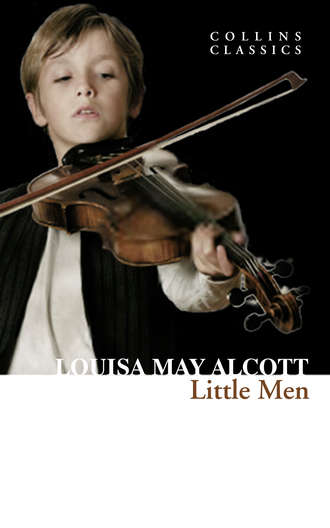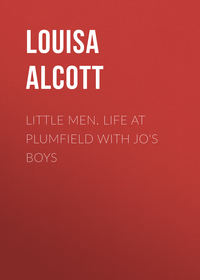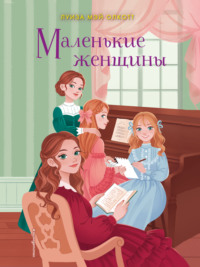
Полная версия
Little Men: Life at Plumfield with Jo’s Boys
“Mrs. Aunt Jo wants these things, and I must have them right away,” said Daisy, importantly.
“Let’s see, honey; here’s two pounds of steak, potatoes, squash, apples, bread, and butter. The meat ain’t come yet; when it does I’ll send it up. The other things are all handy.”
Then Asia packed one potato, one apple, a bit of squash, a little pat of butter, and a roll, into the basket, telling Sally to be on the watch for the butcher’s boy, because he sometimes played tricks.
“Who is he?” and Daisy hoped it would be Demi.
“You’ll see,” was all Asia would say; and Sally went off in great spirits, singing a verse from dear Mary Howitt’s sweet story in rhyme:
“Away went little Mabel,
With the wheaten cake so fine,
The new-made pot of butter,
And the little flask of wine.”
“Put everything but the apple into the store-closet for the present,” said Mrs. Jo, when the cook got home.
There was a cupboard under the middle shelf, and on opening the door fresh delights appeared. One half was evidently the cellar, for wood, coal, and kindlings were piled there. The other half was full of little jars, boxes, and all sorts of droll contrivances for holding small quantities of flour, meal, sugar, salt, and other household stores. A pot of jam was there, a little tin box of gingerbread, a cologne bottle full of currant wine, and a tiny canister of tea. But the crowning charm was two doll’s pans of new milk, with cream actually rising on it, and a wee skimmer all ready to skim it with. Daisy clasped her hands at this delicious spectacle, and wanted to skim it immediately. But Aunt Jo said:
“Not yet; you will want the cream to eat on your apple pie at dinner, and must not disturb it till then.”
“Am I going to have pie?” cried Daisy, hardly believing that such bliss could be in store for her.
“Yes; if your oven does well we will have two pies, one apple and one strawberry,” said Mrs. Jo, who was nearly as much interested in the new play as Daisy herself.
“Oh, what next?” asked Sally, all impatience to begin.
“Shut the lower draught of the stove, so that the oven may heat. Then wash your hands and get out the flour, sugar, salt, butter, and cinnamon. See if the pie-board is clean, and pare your apple ready to put in.”
Daisy got things together with as little noise and spilling as could be expected, from so young a cook.
“I really don’t know how to measure for such tiny pies; I must guess at it, and if these don’t succeed, we must try again,” said Mrs. Jo, looking rather perplexed, and very much amused with the small concern before her. “Take that little pan full of flour, put in a pinch of salt, and then rub in as much butter as will go on that plate. Always remember to put your dry things together first, and then the wet. It mixes better so.”
“I know how; I saw Asia do it. Don’t I butter the pie plates too? She did, the first thing,” said Daisy, whisking the flour about at a great rate.
“Quite right! I do believe you have a gift for cooking, you take to it so cleverly,” said Aunt Jo, approvingly. “Now a dash of cold water, just enough to wet it; then scatter some flour on the board, work in a little, and roll the paste out; yes, that’s the way. Now put dabs of butter all over it, and roll it out again. We won’t have our pastry very rich, or the dolls will get dyspeptic.”
Daisy laughed at the idea, and scattered the dabs with a liberal hand. Then she rolled and rolled with her delightful little pin, and having got her paste ready proceeded to cover the plates with it. Next the apple was sliced in, sugar and cinnamon lavishly sprinkled over it, and then the top crust put on with breathless care.
“I always wanted to cut them round, and Asia never would let me. How nice it is to do it all my ownty donty self!” said Daisy, as the little knife went clipping round the doll’s plate poised on her hand.
All cooks, even the best, meet with mishaps sometimes, and Sally’s first one occurred then, for the knife went so fast that the plate slipped, turned a somersault in the air, and landed the dear little pie upside down on the floor. Sally screamed, Mrs. Jo laughed, Teddy scrambled to get it, and for a moment confusion reigned in the new kitchen.
“It didn’t spill or break, because I pinched the edges together so hard; it isn’t hurt a bit, so I’ll prick holes in it, and then it will be ready,” said Sally, picking up the capsized treasure and putting it into shape with a child-like disregard of the dust it had gathered in its fall.
“My new cook has a good temper, I see, and that is such a comfort,” said Mrs. Jo. “Now open the jar of strawberry jam, fill the uncovered pie, and put some strips of paste over the top as Asia does.”
“I’ll make a D in the middle, and have zigzags all round, that will be so interesting when I come to eat it,” said Sally, loading the pie with quirls and flourishes that would have driven a real pastry cook wild. “Now I put them in!” she exclaimed; when the last grimy knob had been carefully planted in the red field of jam, and with an air of triumph she shut them into the little oven.
“Clear up your things; a good cook never lets her utensils collect. Then pare your squash and potatoes.”
“There is only one potato,” giggled Sally.
“Cut it in four pieces, so it will go into the little kettle, and put the bits into cold water till it is time to cook them.”
“Do I soak the squash too?”
“No, indeed! Just pare it and cut it up, and put in into the steamer over the pot. It is drier so, though it takes longer to cook.”
Here a scratching at the door caused Sally to run and open it, when Kit appeared with a covered basket in his mouth.
“Here’s the butcher boy!” cried Daisy, much tickled at the idea, as she relieved him of his load, whereat he licked his lips and began to beg, evidently thinking that it was his own dinner, for he often carried it to his master in that way. Being undeceived, he departed in great wrath and barked all the way downstairs, to ease his wounded feelings.
In the basket were two bits of steak (doll’s pounds), a baked pear, a small cake, and paper with them on which Asia had scrawled, “For Missy’s lunch, if her cookin’ don’t turn out well.”
“I don’t want any of her old pears and things; my cooking will turn out well, and I’ll have a splendid dinner; see if I don’t!” cried Daisy, indignantly.
“We may like them if company should come. It is always well to have something in the storeroom,” said Aunt Jo, who had been taught this valuable fact by a series of domestic panics.
“Me is hundry,” announced Teddy, who began to think what with so much cooking going on it was about time for somebody to eat something. His mother gave him her workbasket to rummage, hoping to keep him quiet till dinner was ready, and returned to her housekeeping.
“Put on your vegetables, set the table, and then have some coals kindling ready for the steak.”
What a thing it was to see the potatoes bobbing about in the little pot; to peep at the squash getting soft so fast in the tiny steamer; to whisk open the oven door every five minutes to see how the pies got on, and at last when the coals were red and glowing, to put two real steaks on a finger-long gridiron and proudly turn them with a fork. The potatoes were done first, and no wonder, for they had boiled frantically all the while. The were pounded up with a little pestle, had much butter and no salt put in (cook forgot it in the excitement of the moment), then it was made into a mound in a gay red dish, smoothed over with a knife dipped in milk, and put in the oven to brown.
So absorbed in these last performances had Sally been, that she forgot her pastry till she opened the door to put in the potato, then a wail arose, for alas! alas! the little pies were burnt black!
“Oh, my pies! My darling pies! They are all spoilt!” cried poor Sally, wringing her dirty little hands as she surveyed the ruin of her work. The tart was especially pathetic, for the quirls and zigzags stuck up in all directions from the blackened jelly, like the walls and chimney of a house after a fire.
“Dear, dear, I forgot to remind you to take them out; it’s just my luck,” said Aunt Jo, remorsefully. “Don’t cry, darling, it was my fault; we’ll try again after dinner,” she added, as a great tear dropped from Sally’s eyes and sizzled on the hot ruins of the tart.
More would have followed, if the steak had not blazed up just then, and so occupied the attention of cook, that she quickly forgot the lost pastry.
“Put the meat-dish and your own plates down to warm, while you mash the squash with butter, salt, and a little pepper on the top,” said Mrs. Jo, devoutly hoping that the dinner would meet with no further disasters.
The “cunning pepper-pot” soothed Sally’s feelings, and she dished up her squash in fine style. The dinner was safely put upon the table; the six dolls were seated three on a side; Teddy took the bottom, and Sally the top. When all were settled, it was a most imposing spectacle, for one doll was in full ball costume, another in her night-gown; Jerry, the worsted boy, wore his red winter suit, while Annabella, the noseless darling, was airily attired in nothing but her own kid skin. Teddy, as father of the family, behaved with great propriety, for he smilingly devoured everything offered him, and did not find a single fault. Daisy beamed upon her company like the weary, warm, but hospitable hostess so often to be seen at larger tables than this, and did the honors with an air of innocent satisfaction, which we do not often see elsewhere.
The steak was so tough that the little carving-knife would not cut it; the potato did not go round, and the squash was very lumpy; but the guests appeared politely unconscious of these trifles; and the master and mistress of the house cleared the table with appetites that anyone might envy them. The joy of skimming a jug-full of cream mitigated the anguish felt for the loss of the pies, and Asia’s despised cake proved a treasure in the way of dessert.
“That is the nicest lunch I ever had; can’t I do it every day?” asked Daisy as she scraped up and ate the leavings all round.
“You can cook things every day after lessons, but I prefer that you should eat your dishes at your regular meals, and only have a bit of gingerbread for lunch. To-day, being the first time, I don’t mind, but we must keep our rules. This afternoon you can make something for tea if you like,” said Mrs. Jo, who had enjoyed the dinner-party very much, though no one had invited her to partake.
“Do let me make flapjacks for Demi, he loves them so, and it’s such fun to turn them and put sugar in between,” cried Daisy, tenderly wiping a yellow stain off Annabella’s broken nose, for Bella had refused to eat squash when it was pressed upon her as good for “lumatism,” a complaint which it is no wonder she suffered from, considering the lightness of her attire.
“But if you give Demi goodies, all the others will expect some also, and then you will have your hands full.”
“Couldn’t I have Demi come up to tea alone just this one time? And after that I could cook things for the others if they were good,” proposed Daisy, with a sudden inspiration.
“That is a capital idea, Posy! We will make your little messes rewards for the good boys, and I don’t know one among them who would not like something nice to eat more than almost anything else. If little men are like big ones, good cooking will touch their hearts and soothe their tempers delightfully,” added Aunt Jo, with a merry nod toward the door, where stood Papa Bhaer, surveying the scene with a face full of amusement.
“That last hit was for me, sharp woman. I accept it, for it is true; but if I had married thee for thy cooking, heart’s dearest, I should have fared badly all these years,” answered the professor, laughing as he tossed Teddy, who became quite apoplectic in his endeavors to describe the feast he had just enjoyed.
Daisy proudly showed her kitchen, and rashly promised Uncle Fritz as many flapjacks as he could eat. She was just telling about the new rewards when the boys, headed by Demi, burst into the room snuffing the air like a pack of hungry hounds, for school was out, dinner was not ready, and the fragrance of Daisy’s steak led them straight to the spot.
A prouder little damsel was never seen than Sally as she displayed her treasures and told the lads what was in store for them. Several rather scoffed at the idea of her cooking anything fit to eat, but Stuffy’s heart was won at once. Nat and Demi had firm faith in her skill, and the others said they would wait and see. All admired the kitchen, however, and examined the stove with deep interest. Demi offered to buy the boiler on the spot, to be used in a steam-engine which he was constructing; and Ned declared that the best and biggest saucepan was just the thing to melt his lead in when he ran bullets, hatchets, and such trifles.
Daisy looked so alarmed at these proposals, that Mrs. Jo then and there made and proclaimed a law that no boy should touch, use, or even approach the sacred stove without a special permit from the owner thereof. This increased its value immensely in the eyes of the gentlemen, especially as any infringement of the law would be punished by forfeiture of all right to partake of the delicacies promised to the virtuous.
At this point the bell rang, and the entire population went down to dinner, which meal was enlivened by each of the boys giving Daisy a list of things he would like to have cooked for him as fast as he earned them. Daisy, whose faith in her stove was unlimited, promised everything, if Aunt Jo would tell her how to make them. This suggestion rather alarmed Mrs. Jo, for some of the dishes were quite beyond her skill: wedding-cake, for instance, bull’s-eye candy; and cabbage soup with herrings and cherries in it, which Mr. Bhaer proposed as his favorite, and immediately reduced his wife to despair, for German cookery was beyond her.
Daisy wanted to begin again the minute dinner was done, but she was only allowed to clear up, fill the kettle ready for tea, and wash out her apron, which looked as if she had a Christmas feast. She was then sent out to play till five o’clock, for Uncle Fritz said that too much study, even at cooking stoves, was bad for little minds and bodies, and Aunt Jo knew by long experience how soon new toys lose their charm if they are not prudently used.
Everyone was very kind to Daisy that afternoon. Tommy promised her the first fruits of his garden, though the only visible crop just then was pigweed; Nat offered to supply her with wood, free of charge; Stuffy quite worshipped her; Ned immediately fell to work on a little refrigerator for her kitchen; and Demi, with a punctuality beautiful to see in one so young, escorted her to the nursery just as the clock struck five. It was not time for the party to begin, but he begged so hard to come in and help that he was allowed privileges few visitors enjoy, for he kindled the fire, ran errands, and watched the progress of his supper with intense interest. Mrs. Jo directed the affair as she came and went, being very busy putting up clean curtains all over the house.
“Ask Asia for a cup of sour cream, then your cakes will be light without much soda, which I don’t like,” was the first order.
Demi tore downstairs, and returned with the cream, also a puckered-up face, for he had tasted it on his way, and found it so sour that he predicted the cakes would be uneatable. Mrs. Jo took this occasion to deliver a short lecture from the step-ladder on the chemical properties of soda, to which Daisy did not listen, but Demi did, and understood it, as he proved by the brief but comprehensive reply:
“Yes, I see, soda turns sour things sweet, and the fizzling up makes them light. Let’s see you do it, Daisy.”
“Fill that bowl nearly full of flour and add a little salt to it,” continued Mrs. Jo.
“Oh dear, everything has to have salt in it, seems to me,” said Sally, who was tired of opening the pill-box in which it was kept.
“Salt is like good-humor, and nearly every thing is better for a pinch of it, Posy,” and Uncle Fritz stopped as he passed, hammer in hand, to drive up two or three nails for Sally’s little pans to hang on.
“You are not invited to tea, but I’ll give you some cakes, and I won’t be cross,” said Daisy, putting up her floury little face to thank him with a kiss.
“Fritz, you must not interrupt my cooking class, or I’ll come in and moralize when you are teaching Latin. How would you like that?” said Mrs. Jo, throwing a great chintz curtain down on his head.
“Very much, try it and see,” and the amiable Father Bhaer went singing and tapping about the house like a mammoth woodpecker.
“Put the soda into the cream, and when it ‘fizzles,’ as Demi says, stir it into the flour, and beat it up as hard as ever you can. Have your griddle hot, butter it well, and then fry away till I come back,” and Aunt Jo vanished also.
Such a clatter as the little spoon made, and such a beating as the batter got, it quite foamed, I assure you; and when Daisy poured some on to the griddle, it rose like magic into a puffy flapjack that made Demi’s mouth water. To be sure, the first one stuck and scorched, because she forgot the butter, but after that first failure all went well, and six capital little cakes were safely landed in a dish.
“I think I like maple-syrup better than sugar,” said Demi, from his armchair where he had settled himself after setting the table in a new and peculiar manner.
“Then go and ask Asia for some,” answered Daisy, going into the bath-room to wash her hands.
While the nursery was empty something dreadful happened. You see, Kit had been feeling hurt all day because he had carried meat safely and yet got none to pay him. He was not a bad dog, but he had his little faults like the rest of us, and could not always resist temptation. Happening to stroll into the nursery at that moment, he smelt the cakes, saw them unguarded on the low table, and never stopping to think of consequences, swallowed all six at one mouthful. I am glad to say that they were very hot, and burned him so badly that he could not repress a surprised yelp. Daisy heard it, ran in, saw the empty dish, also the end of a yellow tail disappearing under the bed. Without a word she seized that tail, pulled out the thief, and shook him till his ears flapped wildly, then bundled him down-stairs to the shed, where he spent a lonely evening in the coal-bin.
Cheered by the sympathy which Demi gave her, Daisy made another bowlful of batter, and fried a dozen cakes, which were even better than the others. Indeed, Uncle Fritz after eating two sent up word that he had never tasted any so nice, and every boy at the table below envied Demi at the flapjack party above.
It was a truly delightful supper, for the little teapot lid only fell off three times and the milk jug upset but once; the cakes floated in syrup, and the toast had a delicious beef-steak flavor, owing to cook’s using the gridiron to make it on. Demi forgot philosophy, and stuffed like any carnal boy, while Daisy planned sumptuous banquets, and the dolls looked on smiling affably.
“Well, dearies, have you had a good time?” asked Mrs. Jo, coming up with Teddy on her shoulder.
“A very good time. I shall come again soon,” answered Demi, with emphasis.
“I’m afraid you have eaten too much, by the look of that table.”
“No, I haven’t; I only ate fifteen cakes, and they were very little ones,” protested Demi, who had kept his sister busy supplying his plate.
“They won’t hurt him, they are so nice,” said Daisy, with such a funny mixture of maternal fondness and housewifely pride that Aunt Jo could only smile and say:
“Well, on the whole, the new game is a success then?”
“I like it,” said Demi, as if his approval was all that was necessary.
“It is the dearest play ever made!” cried Daisy, hugging her little dish-tub as she proposed to wash up the cups. “I just wish everybody had a sweet cooking stove like mine,” she added, regarding it with affection.
“This play out to have a name,” said Demi, gravely removing the syrup from his countenance with his tongue.
“It has.”
“Oh, what?” asked both children eagerly.
“Well, I think we will call it Pattypans,” and Aunt Jo retired, satisfied with the success of her last trap to catch a sunbeam.
CHAPTER 6
A Fire Brand
“Please, ma’am, could I speak to you? It is something very important,” said Nat, popping his head in at the door of Mrs. Bhaer’s room.
It was the fifth head which had popped in during the last half-hour; but Mrs. Jo was used to it, so she looked up, and said, briskly,
“What is it, my lad?”
Nat came in, shut the door carefully behind him, and said in an eager, anxious tone,
“Dan has come.”
“Who is Dan?”
“He’s a boy I used to know when I fiddled round the streets. He sold papers, and he was kind to me, and I saw him the other day in town, and told him how nice it was here, and he’s come.”
“But, my dear boy, that is rather a sudden way to pay a visit.”
“Oh, it isn’t a visit; he wants to stay if you will let him!” said Nat innocently.
“Well, I don’t know about that,” began Mrs. Bhaer, rather startled by the coolness of the proposition.
“Why, I thought you liked to have poor boys come and live with you, and be kind to ’em as you were to me,” said Nat, looking surprised and alarmed.
“So I do, but I like to know something about them first. I have to choose them, because there are so many. I have not room for all. I wish I had.”
“I told him to come because I thought you’d like it, but if there isn’t room he can go away again,” said Nat, sorrowfully.
The boy’s confidence in her hospitality touched Mrs. Bhaer, and she could not find the heart to disappoint his hope, and spoil his kind little plan, so she said,
“Tell me about this Dan.”
“I don’t know any thing, only he hasn’t got any folks, and he’s poor, and he was good to me, so I’d like to be good to him if I could.”
“Excellent reasons every one; but really, Nat, the house is full, and I don’t know where I could put him,” said Mrs. Bhaer, more and more inclined to prove herself the haven of refuge he seemed to think her.
“He could have my bed, and I could sleep in the barn. It isn’t cold now, and I don’t mind, I used to sleep anywhere with father,” said Nat, eagerly.
Something in his speech and face made Mrs. Jo put her hand on his shoulder, and say in her kindest tone:
“Bring in your friend, Nat; I think we must find room for him without giving him your place.”
Nat joyfully ran off, and soon returned followed by a most unprepossessing boy, who slouched in and stood looking about him, with a half bold, half sullen look, which made Mrs. Bhaer say to herself, after one glance,
“A bad specimen, I am afraid.”
“This is Dan,” said Nat, presenting him as if sure of his welcome.
“Nat tells me you would like to come and stay with us,” began Mrs. Jo, in a friendly tone.
“Yes,” was the gruff reply.
“Have you no friends to take care of you?”
“No.”
“Say, ‘No, ma’am,’” whispered Nat.
“Shan’t neither,” muttered Dan.
“How old are you?”
“About fourteen.”
“You look older. What can you do?”
“’Most anything.”
“If you stay here we shall want you to do as the others do, work and study as well as play. Are you willing to agree to that?”
“Don’t mind trying.”
“Well, you can stay a few days, and we will see how we get on together. Take him out, Nat, and amuse him till Mr. Bhaer comes home, when we will settle about the matter,” said Mrs. Jo, finding it rather difficult to get on with this cool young person, who fixed his big black eyes on her with a hard, suspicious expression, sorrowfully unboyish.









